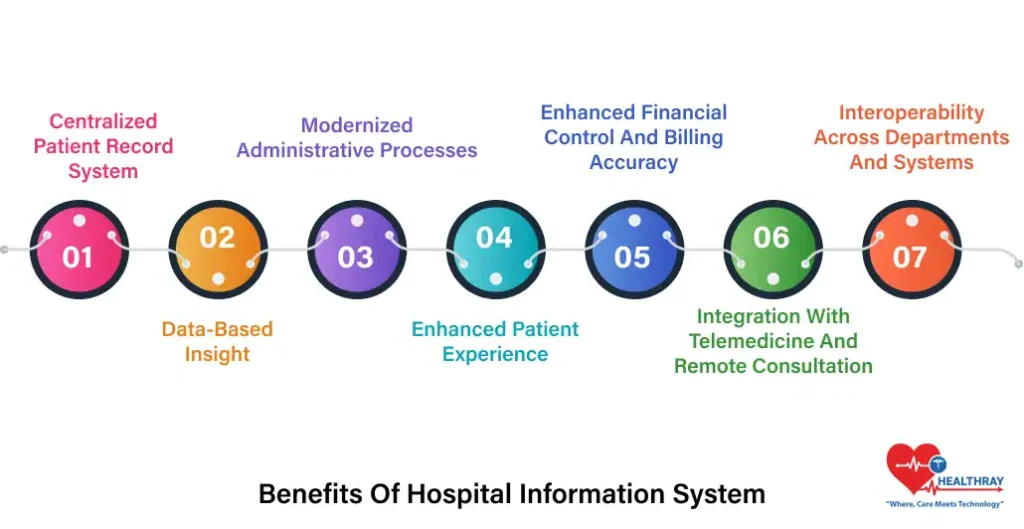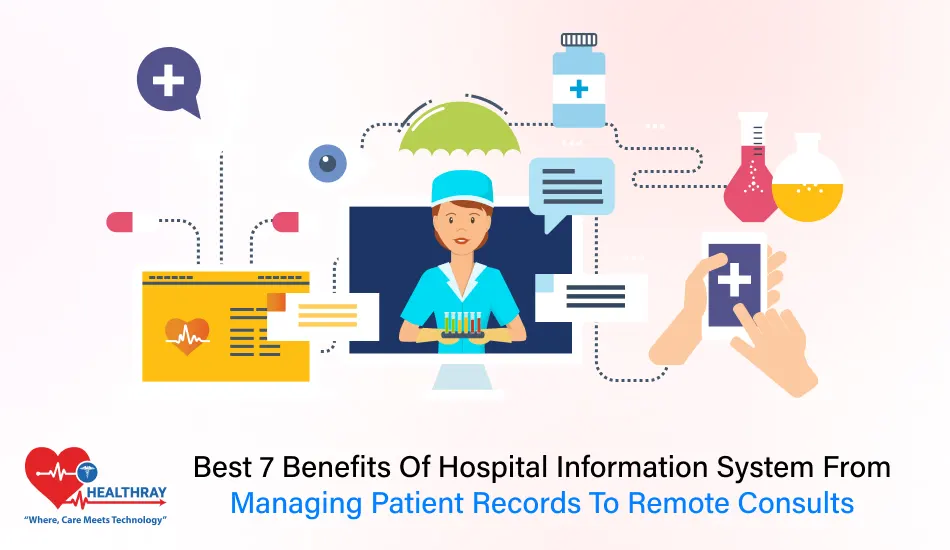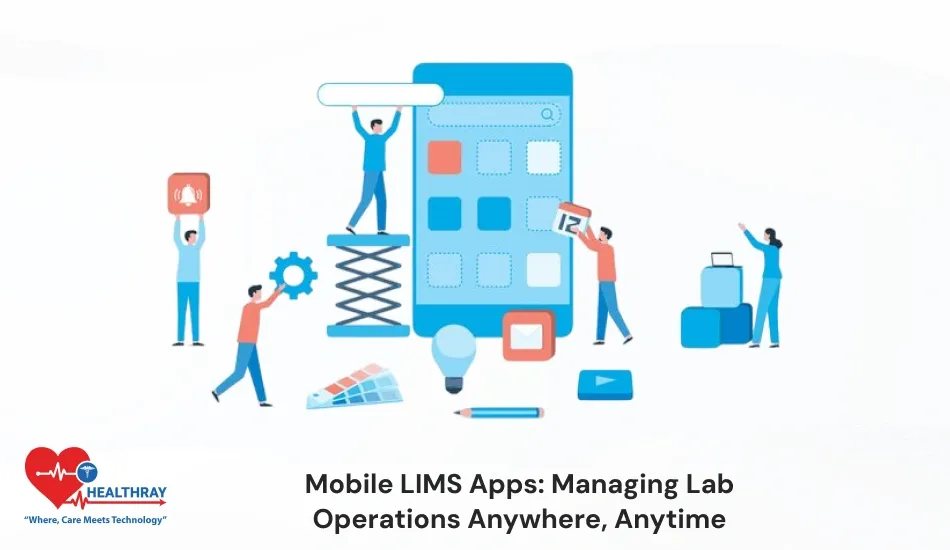Summary
Hospital information system impacts are not just limited to patient care; they also enhance the financial management, regulatory compliance, and patient engagement, creating a more patient-centric and sustainable healthcare model. In this blog, I will explore real-time benefits of hospital information systems, and also I will cover how hospital information systems are a digital backbone for hospitals that drives quality, efficiency, and innovation. Let’s begin!!!
Introduction
In today’s fast healthcare environment, digital technologies have modified the practices of hospitals and clinics. In this transformation, the hospital information system is playing a crucial role. Furthermore, it is an advanced software platform that manages every aspect of hospitals, such as patient registration, electronic medical records, billing, laboratory, pharmacy, or telemedicine services. Further, emr software simplifies the complex workflows and allows seamless data sharing among different departments.
I am working as an admin manager in hospitals. In the traditional system, my hospital workflows were completely disorganized. Furthermore, it took a few weeks to provide responses to all inquiries of the patients. The entire staff became confused, and in order to obtain all of the patient information, we had to manually call several departments. Since I adopted the hospital information system, I discovered many changes in just a few weeks.
Our entire medical operation got automated; Now in just a few clicks we can retrieve, share and modify patient records. Furthermore, Modern healthcare systems need speed, precisions and coordination. Manual infrastructure and paper-based systems are ineffective in providing these qualities. Overall, Hospital information management systems help firms overcome these challenges by providing centralized or real-time access to patient data.
Benefits of Hospital Information System

Let’s find out the interesting advantages of EMR software:
Centralized patient record system
The most powerful feature of a hospital information system is a centralized patient record system. Furthermore, in the traditional system, we keep records in multiple frameworks. Therefore, it was too difficult for hospitals to retrieve information at the time of urgency. Furthermore, Doctors and nurses needed to call multiple times to get a single piece of information. Also, it takes a few weeks to prepare a complete report of patients.
Further, with the hospital information system, you don’t need to take any stress about retrieving patients’ records. Through hospital software, now you can store complete medical data of patients, such as diagnoses, lab reports, prescriptions, and discharge summaries, in a single digital platform. Further, now you need to stress about managing scattered files and documents. Doctors and staff can now easily access patient records, which makes the decision process fast and accurate. Furthermore, Hospital software automatically updates the data in the system, thereby reducing the diagnostic error in the medical operations. Additionally, the cloud backup system remains secure, even during times of interruption.
Data-based Insight
In a traditional clinic setup, data are mostly stored in manual records and spreadsheets. Further, it is difficult for doctors to accurately analyze the patient’s symptoms. Managers need to compile different reports to accurately understand the clinic’s performance and trends. Further, it is a time-consuming process and is more prone to errors. Are you still relying on old approaches to taking decisions? Manual approaches will not be effective in 2025.
Further, hospitals should use fast and advanced AI platforms that help them generate reports automatically. Furthermore, with a hospital management solution, doctors can easily analyze real-time patient data, instantly check the lab results and instantly identify risk factors. Further, clinical decision support modules provide alerts to doctors related to any drug interaction, abnormal test result, or treatment deviation. Additionally, the best emr system helps doctors to make smarter and faster decisions at every step. Overall, the hospital information system creates a data-driven ecosystem that makes the healthcare system smarter, safer and more efficient.
Modernized administrative processes
It is a challenging task for hospital administrators to manage resource allocation, time management, and workforce scheduling. Furthermore, administrative personnel in manual infrastructure typically enter data into the system by hand, which leads to more errors. However, with a hospital information system, you can easily automate tedious activities to make the administrative tasks smarter and more efficient. Further, Hospitals are able to optimize bed occupancy and cut down on patient wait times with HIS automated scheduling.
Furthermore, it helps reception, pharmacy, and billing departments to follow standard operating procedure, which makes the workflow smooth and consistent. Additionally, administrators get a real-time performance dashboard to monitor the operation smoothly and take timely decisions. Overall, medical software streamlines hospital operations, improves efficiency, and takes patient satisfaction to a higher level.
Step towards digital era with our healthcare solution
Revamp your hospital facilities and embrace change for better healthcare management. Ease in managing and organizing large medical datasets leads to effective analysis. Seize the opportunity now!
Enhanced patient experience
Digitalization not only benefits hospitals, but also it creates positive impacts on both patient satisfaction and trust. Further, with hospital digital solutions, hospitals can make their services faster, transparent and patient-friendly. In addition, Hospital software provides faster delivery service to patients, such as digital appointments, smart queue systems, and online payments, to provide relief from long waiting hours.
Further, it eases the communication and provides transparency through sms alerts appointment reminders, test results, and medication updates. Additionally, HIS stores patient preferences and medical history and additionally assists doctors in making personalized treatment care plans for patients. Overall, with health information management software, patients can easily access their records, prescriptions, and bills by sitting anywhere in the world.
Enhanced financial control and billing accuracy
Hospital financial management is a most complex process. Further, it is difficult for hospitals to handle insurance claims, billing workflows, and regulatory compliance. Furthermore, with a clinical management system, you can simplify these challenges and can make the billing process more accurate and transparent. Further, hospital-integrated billing software automatically calculates consultations, diagnostics, room charges and other services, eliminating the need for manual calculation.
Furthermore, it significantly reduces human errors, thus making the claim accurate and the payment process faster. Furthermore, clinical software supports direct claim submission and tracking, thereby making the insurance process smooth. Additionally, it ensures all chargeable services are accurately billed and there is no loss of revenues. Overall, hospital online software primarily minimizes missed billing or service undercharges.
Integration with telemedicine and remote consultation
As we know, virtual care adoption has surged post-covid pandemic. Further, modern HIS systems integrate seamlessly with telemedicine modules, which makes the remote consultation feasible. Further, with clinical virtual software, doctors can easily schedule virtual appointments and can access patient files, history, and diagnostics before consultation. Also, it helps hospitals automatically generate digital prescriptions, lab requests, and follow-up schedules.
Further, doctors can remotely monitor chronic patients, and rural patients can easily connect to specialists without the need to travel. Additionally, with clinical digital software, doctors can expand their reach beyond physical boundaries and with easy digital follow-up, it fosters both patient trust and engagement. Overall, patient complaint management software increases patient reach and improves follow-up compliance.
Interoperability across departments and systems
Traditional hospital system mainly deals with data silo challenges. Further, it is difficult for different departments to share the data. Do you still feel difficulty connecting with other departments? Then, it’s time to upgrade. In 2025, hospitals no longer use manual approaches like calls and emails to connect with different departments. Further, clinical online services seamlessly connect different departments like radiology, pharmacy, diagnostics, and administration. Furthermore, Lab results automatically get updated in the doctor’s dashboard and make the real-time access more feasible.
Further, clinical management software minimizes the dependency on manual reports delivery and subsequently, staff can efficiently communicate with each other. Additionally, a multi-specialty team decides the patient care plan and collaborates with the team through practical insights. Overall, hospital interoperability systems improve accuracy, reduce turnaround times and make the decision-making process fast and dependable.
Conclusion
Hospital Information Systems are no longer just IT tools; they are the very foundation of digital healthcare delivery. Furthermore, by embedding intelligence, interoperability, and convenience into day-to-day operations, an HIS ensures that hospitals function as cohesive, efficient, and patient-centered organizations.
I hope the above blog provides you useful insights into hospital information systems and how they help hospitals to simplify their operations and empower them to make tangible decisions.




